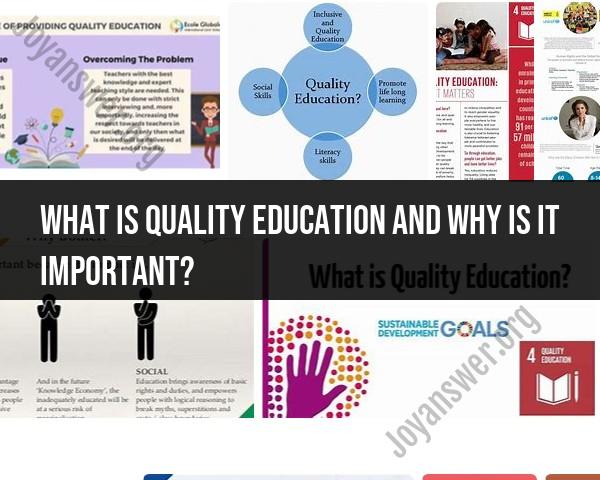What is quality education and why is it important?
Quality education is an education system that provides students with a well-rounded, comprehensive, and effective learning experience. It goes beyond the mere transmission of information and focuses on developing students' knowledge, skills, critical thinking abilities, character, and values. Quality education is essential for personal growth, societal progress, and the development of a skilled and informed citizenry. Here are some key aspects of quality education and why it is important:
Key Aspects of Quality Education:
Relevance: Quality education is relevant to the needs of students, society, and the workforce. It offers a curriculum that is up-to-date, aligned with real-world demands, and designed to prepare students for success in their future careers.
Equity: Quality education should be accessible to all, irrespective of socioeconomic background, gender, or other factors. It promotes inclusivity and provides equal opportunities for learning and personal development.
Effective Teaching: Quality education requires skilled and dedicated teachers who use effective teaching methods, encourage student engagement, and create a positive learning environment.
Critical Thinking: It fosters critical thinking skills, problem-solving abilities, and a deep understanding of subjects. Students are encouraged to question, analyze, and apply what they learn.
Character Development: Quality education is not just about academics; it also emphasizes character development and the cultivation of values like empathy, respect, and integrity.
Life Skills: It equips students with essential life skills, such as communication, collaboration, time management, and adaptability, which are valuable for success in both personal and professional life.
Importance of Quality Education:
Economic Growth: Quality education is a driver of economic growth and development. It produces a skilled and adaptable workforce that is crucial for innovation, productivity, and competitiveness.
Social Mobility: It can reduce inequalities by providing opportunities for individuals to improve their circumstances and socio-economic status through education.
Civic Engagement: Quality education encourages active citizenship and civic engagement. Informed and educated citizens are more likely to participate in the democratic process and contribute positively to society.
Health and Well-being: Education is linked to better health outcomes and improved well-being. It helps individuals make informed choices about their health and lifestyle.
Innovation: Quality education nurtures creativity and innovation, driving progress in science, technology, arts, and other fields.
Global Perspective: In an increasingly interconnected world, quality education promotes a global perspective, fostering cultural understanding, tolerance, and cooperation on a global scale.
Problem Solving: It equips individuals with the skills to address complex challenges facing society, from environmental issues to social problems.
Quality of Life: Education enhances the overall quality of life by providing individuals with the knowledge and tools to lead fulfilling and meaningful lives.
Social Cohesion: Quality education promotes social cohesion and a sense of community, as individuals with diverse backgrounds come together to learn and grow.
In summary, quality education is not only an investment in individual development but also a cornerstone of societal progress. It empowers individuals to lead fulfilling lives, contribute to the betterment of society, and address the complex challenges of the modern world. Quality education is a fundamental right that should be accessible to all, and its significance extends far beyond the classroom.
Defining Quality Education and Its Key Components
Quality education is education that meets the needs of all learners and helps them to reach their full potential. It is an education that is inclusive, equitable, and relevant.
The key components of quality education include:
- Access to education: All learners should have access to quality education, regardless of their background or circumstances.
- Equity in education: All learners should have the opportunity to succeed in school and reach their full potential.
- Relevance of education: Education should be relevant to the needs of learners and the society in which they live.
- Quality of teaching and learning: Teaching and learning should be effective and engaging.
- Supportive learning environment: The learning environment should be safe and supportive, and it should promote the well-being of all learners.
The Importance of Quality Education in Personal and Societal Development
Quality education is essential for both personal and societal development.
On a personal level, quality education can help individuals to:
- Develop their full potential
- Acquire the knowledge and skills they need to succeed in life
- Become informed and engaged citizens
- Live healthy and fulfilling lives
On a societal level, quality education can help to:
- Promote economic growth
- Reduce poverty and inequality
- Promote social cohesion and peace
- Achieve sustainable development
Measuring and Evaluating Educational Quality
There are a number of different ways to measure and evaluate educational quality. Some of the most common measures include:
- Student achievement: Student achievement can be measured through standardized tests, teacher assessments, and other methods.
- Graduation rates: Graduation rates measure the percentage of students who complete their education.
- College and career readiness: College and career readiness measures the percentage of students who are prepared for college and careers after graduation.
- Teacher quality: Teacher quality is an important factor in educational quality. There are a number of different ways to measure teacher quality, such as teacher qualifications, teacher performance evaluations, and student surveys.
- School resources: School resources, such as funding, facilities, and technology, can also affect educational quality.
Strategies for Ensuring Access to Quality Education
There are a number of different strategies for ensuring access to quality education for all learners. These strategies include:
- Investing in education: Investing in education is essential for ensuring that all learners have access to quality education.
- Expanding access to early childhood education: Early childhood education is important for laying the foundation for future success.
- Providing support for students from disadvantaged backgrounds: Students from disadvantaged backgrounds often need additional support to succeed in school. This support can include things like tutoring, mentoring, and financial assistance.
- Promoting inclusive education: Inclusive education ensures that all learners, regardless of their abilities or backgrounds, have the opportunity to succeed in school.
- Empowering teachers: Teachers play a vital role in ensuring quality education. It is important to empower teachers and provide them with the resources and support they need to be successful.
Global Initiatives and Challenges in Promoting Quality Education
There are a number of global initiatives and challenges in promoting quality education.
One of the most important global initiatives is the Sustainable Development Goals (SDGs). SDG 4 calls for ensuring inclusive and equitable quality education and promoting lifelong learning opportunities for all.
Other important global initiatives include:
- Education for All (EFA): EFA is a global initiative that aims to ensure that all children have access to basic education.
- Millennium Development Goals (MDGs): MDG 2 called for achieving universal primary education.
- Global Partnership for Education (GPE): GPE is a global partnership that aims to ensure that all children have access to quality education.
Some of the challenges in promoting quality education include:
- Poverty: Poverty is a major obstacle to access to quality education.
- Conflict and instability: Conflict and instability can disrupt education and make it difficult for children to learn.
- Discrimination: Discrimination can also prevent children from accessing quality education.
- Lack of qualified teachers: There is a shortage of qualified teachers in many parts of the world.
- Inadequate resources: Many schools lack the resources they need to provide quality education.
Despite the challenges, there has been significant progress in promoting quality education in recent years. The global enrollment rate for primary education has reached 91%. However, there is still more work to be done to ensure that all learners have access to quality education.
By investing in education, expanding access to early childhood education, providing support for students from disadvantaged backgrounds, promoting inclusive education, and empowering teachers, we can make quality education a reality for all learners.













